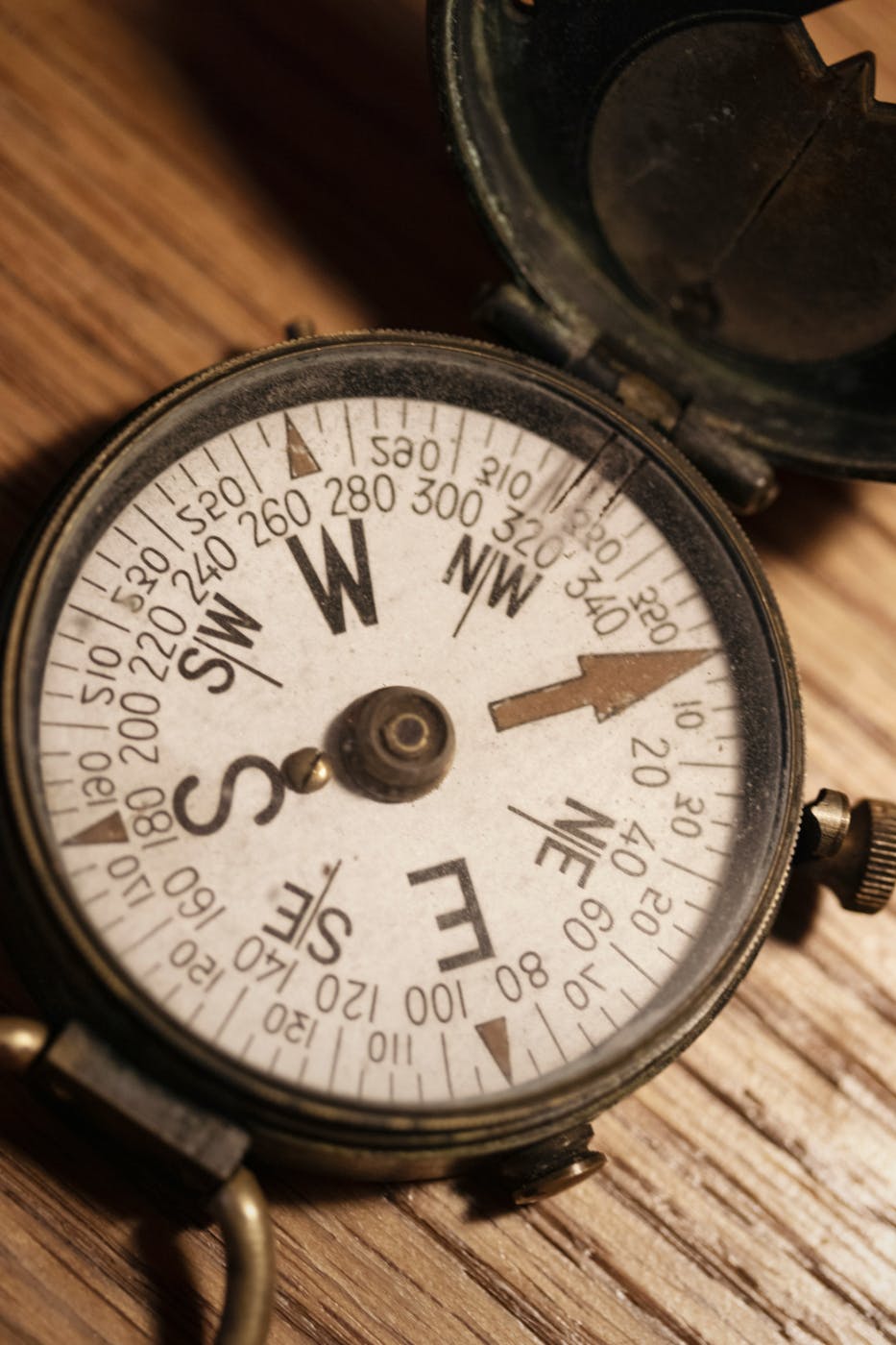
But what about a moral compass? Do we all come equipped with one, like a free bonus in our human starter kit? Order now and receive a moral compass plus a set of steak knives!
A compass: that little round gadget with a magnetized needle that always points north—unless, of course, you’re standing next to something magnetic, in which case, all bets are off. In the wilderness, a compass is your best friend, a loyal guide keeping you from walking in circles and muttering about how that tree looks familiar.
But what about a moral compass? Do we all come equipped with one, like a free bonus in our human starter kit? Order now and receive a moral compass plus a set of steak knives! Are we born with an innate sense of right and wrong, or is morality something we have to assemble ourselves—like an IKEA shelf, but with even more confusing instructions?
I have found myself screaming at the radio, yes, the radio, because I live in 1905; how can you possibly think that way more often than I used to. Maybe it’s the fact that I’m getting older, and at a certain age, government people show up, give you bad dentures and a rocking chair, and tell you that now you have to start yelling at the kids in the neighborhood and start every sentence with “Back in my day.” But I have been thinking about compasses and how we have gotten so far off track. How did we get so lost when this compass was in our pockets the entire time? Maybe we just put the ol’ moral compass in the kitchen junk drawer, never to be retrieved again.
Maybe there’s no such thing? However …
Science suggests that children show signs of moral reasoning from birth. That’s right, before they can even hold their own heads up, babies are making tiny, silent judgments about the world around them. It’s both comforting and terrifying to think that even at a few months old, humans are already categorizing people into ‘good guy’ and ‘bad guy’ columns. But if we all start with some kind of moral direction, why do so many people seem to lose their way? And, more importantly, is there a way to keep our internal compass aligned?
Are We Born with a Moral Compass?
According to research, even infants as young as three months old show preferences for people who are kind and helpful rather than those who are mean and selfish. This suggests that morality isn’t just something we learn; it’s something we start with.
But before we start feeling too good about ourselves, let’s remember that babies also have no problem screaming in your face at 3 a.m. because they dropped their pacifier. So, while we may have some basic moral instincts, they definitely need fine-tuning.
As we grow, our sense of right and wrong gets shaped by family, culture, and society. If you grew up in a home where honesty was valued, you probably learned early on that lying had consequences (like a long lecture from your parents and that sinking feeling of guilt). But if you grew up in an environment where bending the truth was just another way to get ahead, well, let’s just say your moral compass might need some recalibrating.
Can a Moral Compass Be Ignored or Broken?
Absolutely. Just like a regular compass can go haywire when it’s near a strong magnetic field, a moral compass can be thrown off by outside influences. Peer pressure, greed, power—all of these can mess with our internal navigation.
Ignoring a moral compass doesn’t usually happen all at once. It’s a slow process. It starts small: a little white lie here, a minor ethical compromise there. The next thing you know, you’re in deep, convincing yourself that your choices are justified. Ever wonder why people who once seemed principled suddenly end up embroiled in scandals? It’s often because they took one wrong step, then another, until they were too far gone to find their way back.
And here’s the kicker: when we repeatedly ignore our moral compass, it doesn’t just stop working—it adjusts itself to accommodate our actions. This is why someone who starts out fudging expense reports can end up committing outright fraud. They’ve convinced themselves that they’re still ‘basically good,’ even as their ethical boundaries shift further and further.
The good news? Just like a malfunctioning compass can be recalibrated, so can our sense of morality. It takes effort, reflection, and sometimes a hard look in the mirror, but a moral course correction is always possible.

The Role of a Moral Compass in Business and Life
Having a strong moral compass isn’t just about feeling good about yourself; it’s also about making choices that help you sleep at night. In business, ethics can be the difference between long-term success and being the subject of a documentary about corporate greed.
Think about it: the best leaders aren’t just the ones who make the most money; they’re the ones who people trust. A CEO who prioritizes integrity over quick profits is more likely to build a company that lasts. On the flip side, we’ve seen what happens when businesses cut corners, deceive customers, or exploit workers—it rarely ends well.
Consider the world of business scandals: fraud, insider trading, exploitation—it’s a greatest hit album of what happens when people ignore their moral compass for personal gain. And yet, those who operate with honesty and transparency often find success not just financially, but in reputation, loyalty, and long-term impact.
And what about in our personal lives? The way we treat people and the way we uphold our values, even when no one is watching, all speak to the strength of our moral compass. The truth is, morality isn’t just about big decisions; it’s about the small, everyday ones. Do we cut corners when no one is looking? Do we take advantage of a situation when it benefits us? These seemingly minor choices add up, shaping not just our character but the kind of world we create around us.

What Happens When Companies Ignore Their Moral Compass?
History is littered with companies that prioritized profits over ethics, and the fallout is often catastrophic. Think of Enron, a company once hailed as an industry leader, only to collapse under the weight of fraudulent accounting practices. The executives ignored their moral compass, and in the end, employees lost their jobs, investors were ruined, and the company’s name became synonymous with corporate corruption.
Or take Volkswagen’s emissions scandal—when they rigged their vehicles to cheat on emissions tests. For a while, they reaped the benefits, but when the truth came out, the damage to their reputation, finances, and trust was immeasurable.
The lesson? A company without a moral compass might thrive for a while, but eventually, unethical behavior catches up. Employees become disillusioned, customers lose trust, and legal consequences can bring everything crashing down.
Can a Moral Compass Be Wrong?
Sometimes, what we think is morally right turns out to be wrong in hindsight. History is full of examples where people believed they were on the right side of morality, only to later realize they were way off course.
Consider past societies where oppressive practices were not only accepted but encouraged. What was once viewed as ‘moral’ was later condemned as deeply unethical. This shows that our moral compass is, at times, flawed—not because it doesn’t work, but because it’s influenced by the norms of our time.
This is why self-reflection and learning are crucial. A rigid moral compass that refuses to adjust when faced with new truths can be just as dangerous as having no compass at all. Morality isn’t just about sticking to what we think is right—it’s about constantly evaluating, questioning, and, when necessary, course-correcting.
Summing Up
A strong moral compass doesn’t mean we never make mistakes—it means we recognize when we’ve gone off course and have the courage to correct it. The world is full of moral gray areas, but those who actively engage with their sense of right and wrong tend to find their way forward with greater clarity.
So, the real question isn’t whether we have a moral compass—it’s whether we’re using it. Because, let’s be honest, some of us could use a moral compass tune-up before we end up lost in the wilderness of our own bad decisions. And if your moral compass has been gathering dust? Well, there’s no time like the present to give it a good shake and make sure it still points north.

